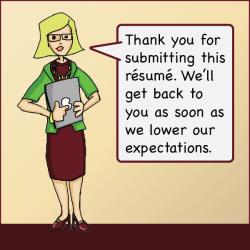Follow Instructions or Lose

Recently, we posted a job opening on Craig’s List for an internship. We realized that one of the challenges of using an intern is the fact that, by nature, they do not have the skill set they’ll need to really do the job well. When hiring an intern you look at a meager résumé and a simple cover letter then hope that you bring someone on that can provide enough value to help your business.
We’ve learned, from the past, that sometimes it’s easier to train people to be successful in our organization than it is to hire people with the right skill set to begin with. There is simply so much more to an employee (or a person, for that matter) than the technical knowledge they possess. An internship is a great way to identify the raw talent your employee will need to be successful at a much lower initial financial risk.
With our job posting, we decided to include a little test to see how well our prospective interns would follow instructions. We knew that posting a paid internship that required no experience would generate quite a few résumés. We knew that we needed to weed through the candidates without taking too much time.
The test was actually pretty simple. Like most tests in life, we didn’t tell anyone it was a test. We wanted to see who would follow instructions not knowing the first interview depended on it. A real test of skill is being great when you don’t know someone is watching.
At the end of the job posting, we had a paragraph that indicated the three things needed for submitting the résumé. They were:
- Send an email with the subject line of “Web Intern” to a specific email address.
- Include a paragraph of why you want to be an intern for a Web company.
- Include your résumé in a Word .doc or .docx format.
Just because someone couldn’t follow these instructions is not necessarily an indication they would be a bad employee, but it might be an indication they don’t read and comprehend a job requirement for one of our clients. We simply can’t afford going back and forth with an assignment until someone finally gets it right.
In only one week, we received over 50 submissions. 15 of them didn’t get the subject line correct or didn’t attach the résumé in the right format. 2 of those 15 didn’t do both. We had at least 15 not do a very good job indicating why they wanted to be an intern for us (if they did at all).
Interestingly enough one of the best submissions was by a very talented young lady who is only a junior in high school and I could see the only reason we couldn’t hire her is that her school schedule may conflict with our long-term goals.
The most amazing experience I had was with an applicant that actually argued with me via email as I was trying to help him learn from his mistake. I was so amazed; I decided to post here the conversation (via email) that he and I had.
One of our first submissions was from a young man that was finishing his “core classes” to transfer to a four-year university. His extraordinarily long intro in his email was full of all the reasons he would benefit and not how he could help us be successful but the most telling was the fact that he didn’t attach his résumé because, he “lost the flash drive with [his] résumé on it” so he linked to his awful website. My response:
Thank you for your interest in our Web Internship Position. We will not be contacting you for the next phase as you didn’t following the instructions in the posting. You should have recreated your résumé and included it.
To this, he replied:
I just figured that I was “going the extra mile” I didn’t think it was a negative thing, as I have been told by job center employees that web portfolios are the way to go with Web Development postions.
At this point, I finally actually clicked on the link and it was a very poor excuse for a Web portfolio. So, I simply replied:
They might be wrong
So he decides to keep trying to get his résumé in. Rather than admitting he made a mistake, he continues to blame others:
So there is no chance I can re-apply the right way, since I was given information that is a fallacy from a state agency?
I feel for the guy at this point but mostly because he either wasn’t taught correctly or he wasn’t paying attention and I decide to give him the benefit of the doubt:
I’ve already spent more time on this than I’d like but I hope you can see some future opportunity.
I’m sure the agency didn’t give you the wrong information but your assumption is that you should have chosen to not follow their advise but to follow the instructions. The instructions of the submission request always come first and foremost. The agency doesn’t have any idea what my expectations are they can only give you general guidelines.
You indicated in your response that you seemed to understand the requirement but chose to ignore it by pointing out that you lost your drive but that I could see it elsewhere. When you are submitting your résumé for consideration, you must understand that hiring managers see many for each job posting. If you don’t follow instructions, they will make a judgment based on that.
I recommend that you spend a considerable amount of time working on your résumé. You need to get it into Word format and polish it until there are zero mistakes. Department of Labor can help you with that.
My favorite of all responses was his final response:
I would like to see a world where a person gets hired based on their computer skills and not a tiny mistake on a resume, considering that makes more sense for the said job, and as for communications skills, this right here is communication. I’ve just never ever not gotten an interview based on a communication mistake concerning how to apply. Usually the person emails me back and tells me to fix it and re-apply, and doesn’t say you did it wrong and now your done. Ill leave you alone now.
I restrained myself from responding:
I would like to see a world where job applicants follow instructions.
The moral: Follow instructions. You never know when it’s a test.

Corey Smith and his wife are the proud parents of five wonderful children and live in Meridian, Idaho. He is the president of Tribute Media, a Meridian based Web Consulting firm.
He is the author of two books, "Do It Right: A CEO's Guide to Web Strategy" and "Tweet It Right: A CEO's Guide to Twitter." You can learn more about his books here.
Interested in having Corey speak for your organization? Need help building or marketing your organization? Want to tell Corey how cool you think he is?
